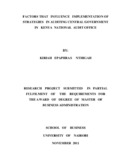| dc.contributor.author | Kiriah, Epaphras N | |
| dc.date.accessioned | 2016-05-16T09:57:03Z | |
| dc.date.available | 2016-05-16T09:57:03Z | |
| dc.date.issued | 2011 | |
| dc.identifier.uri | http://hdl.handle.net/11295/95701 | |
| dc.description.abstract | The environment in which organizations operate is dynamic and highly unpredictable. Employees of an organization are its greatest assets and therefore the manner in which an organization’s strategies are implemented will have a marked impact on the employees as individuals and collectively as groups, be it positive or negative, either in the way they perform their duties or in the way they relate to each other and to the organization's other stakeholders. Implementation of strategies will always face challenges due to turbulence of environment in which the organization operates. Kenya National Audit Office is a unique organization in the public sector whose vision is to be a lead agency in promoting good governance and effective accountability in the management of public resources while its motto is promoting accountability in the Public Sector. It is the only organization mandated by law to audit and report on public funds in Kenya making it Kenya’s Supreme Audit Institution. By virtue of being the only organization authorized by law to audit the government’s income and expenditure, Kenya National Audit Office is a member of English speaking International Organization of Supreme Audit Institutions and also a member of English Speaking African Organization of Supreme Audit Institutions.
The study sought to establish the factors that influence implementation of Kenya National Audit Office’s strategies in the audit of Central Government and how to address the challenges.
vi
The study used primary data collected through interviewing technical staff who comprise of branch managers, audit staff in Nairobi and audit staff in the Provinces at their places of work. Thus intensive data of several variables considered to be critical in the attainment of Kenya National Audit Office’s Constitutional mandate with respect to audit of Central Government in their natural setting was collected and analyzed. The technical staff are the ones who carry out the actual audit of Central Government while the management and senior management review their work. The audit findings made by the technical staff are either incorporated in the Auditor General’s report or dropped all together by the senior management. The study established that although the organization had embraced strategic planning as a way of fulfilling its mandate, the mission and vision were not well communicated to the technical staff. It also established that both management and senior management had a role to play in the timely submission of the report to parliament. The study was considered important as it would provide an insight into the challenges that are faced while auditing Central Government and how the challenges can be addressed. | en_US |
| dc.language.iso | en | en_US |
| dc.publisher | University of Nairobi | en_US |
| dc.rights | Attribution-NonCommercial-NoDerivs 3.0 United States | * |
| dc.rights.uri | http://creativecommons.org/licenses/by-nc-nd/3.0/us/ | * |
| dc.title | Factors That Influence Implementation of Strategies in Auditing Central Government in Kenya National Audit Office | en_US |
| dc.type | Thesis | en_US |



